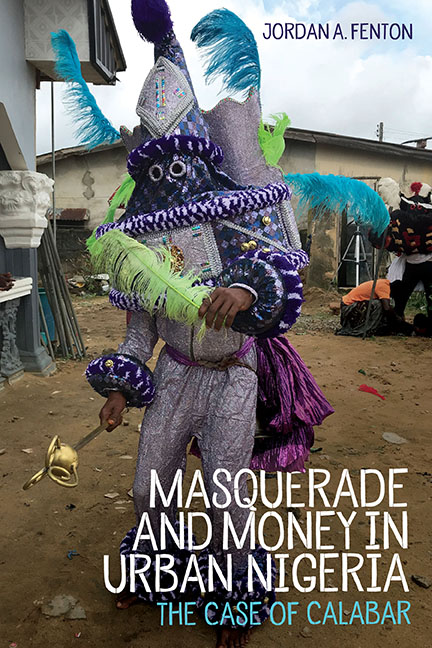Chapter Two - “Face No Fear Face”: Unmasking Youths
Published online by Cambridge University Press: 26 May 2022
Summary
On a November afternoon in 2009, Henshaw Town, also known as Nsidung, a district of Calabar South, exploded with the sounds, music, and performance of their local Agaba faction (Figure 2.1). The group known as Nsidung, a youth Agaba association composed of the infamous Nigerian Area Boys, overtook their local community with the seductive sounds of their gongs. Nsidung's hostile energy was also felt as two armed masqueraders, along with fellow members who were concealing machetes, poured into the streets. The performance followed the initiation of a new member. The display was the final part of the new member's induction, announcing to the community that another had joined their ranks. And so, for about two hours, Nsidung used this opportunity to reinforce their territorial claim over Henshaw Town.
About thirty minutes into the performance, as the audience slowly grew in size, the two masqueraders did something unimaginable: they unmasked! The president of the Nsidung faction, wearing a wooden facemask, dancing in the foreground of the assembled group, held the attention of the onlookers. In the blink of an eye, he paused his choreography and slid his mask to the top of his head, revealing his identity to the gathered community (Figure 2.2). Immediately following this audacious act of unmasking, he stood with his hands raised, in a threatening manner, facing the crowd, a content smirk on his face, enjoying his defiant moment of breaking the most sacred and ubiquitous rule of African masking: removing the veil of secrecy, thus undermining the very power that “lurks” in the mask.
After the second masquerader followed suit and unmasked, the president grabbed his machete and started to duel with a fellow member. With the mask now lying on the concrete road, the aggressive, theatrical machete bout demonstrated the real potent force behind Agaba: the notoriously known members having the spirit and mind to use violence and hostility when necessary (Figure 2.3). The case of unmasking and threat of violence is far from “boys just being boys” or merely youths “playing around” with masquerades. Both acts suggest how important spatial and economic concerns are in the culture of masquerade and performances in the city.
- Type
- Chapter
- Information
- Masquerade and Money in Urban NigeriaThe Case of Calabar, pp. 32 - 70Publisher: Boydell & BrewerPrint publication year: 2022

